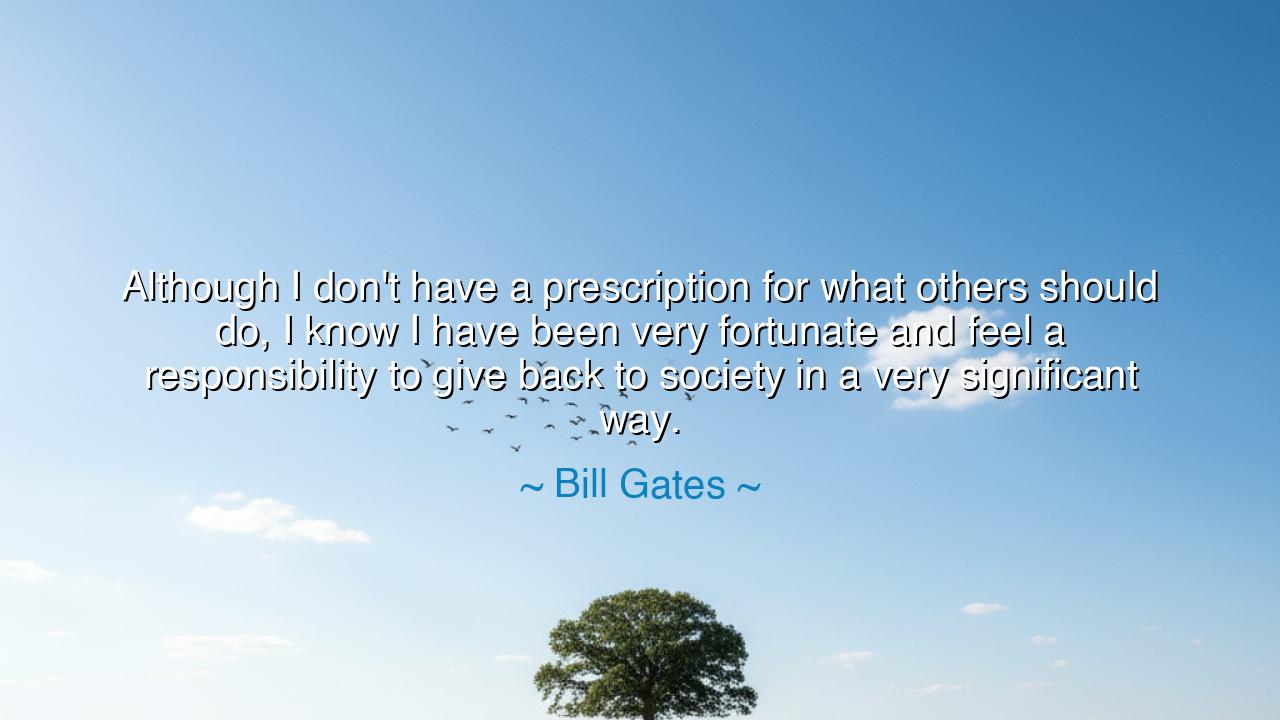
Although I don't have a prescription for what others should do, I
Although I don't have a prescription for what others should do, I know I have been very fortunate and feel a responsibility to give back to society in a very significant way.






Hear the humble yet powerful words of Bill Gates: “Although I don't have a prescription for what others should do, I know I have been very fortunate and feel a responsibility to give back to society in a very significant way.” In these words lies the recognition of a profound truth: that wealth and success, when hoarded, are barren, but when shared, become a fountain of life. Gates confesses that fortune is not born of merit alone, but of circumstance, opportunity, and the labors of others. From that recognition arises a sacred duty—to give back to society, not with small gestures, but with significant action that heals, uplifts, and transforms.
The origin of this statement can be traced to Gates’s journey from building Microsoft into a global empire to devoting himself to philanthropy. He saw that his success, though remarkable, was part of a larger system: mentors who guided him, workers who built with him, a society that created the space for innovation. Acknowledging this, he turned from mere accumulation to stewardship, founding the Bill and Melinda Gates Foundation, one of the greatest forces for public good in modern times. His words are not commands to others but a reflection of his personal revelation: that with great fortune comes an equally great responsibility.
The ancients themselves honored this principle. In Athens, wealthy citizens were required to perform liturgies—public services paid from their own wealth, funding festivals, theaters, and ships for the navy. It was not seen as charity, but as a duty to the polis, a way of giving back to the society that had nurtured their prosperity. Those who shirked this responsibility were scorned; those who embraced it were remembered as benefactors. Gates’s words echo this ancient wisdom: that fortune is not truly one’s own, but belongs also to the community that sustains it.
History gives us the example of Andrew Carnegie, the steel magnate of America’s Gilded Age. Like Gates, Carnegie amassed unimaginable wealth, but in his later years he declared that “the man who dies rich dies disgraced.” He poured his fortune into libraries, schools, and foundations, believing that wealth must serve the many, not the few. His philanthropy built institutions that endure to this day. Gates’s words flow from the same river: that to give back in a significant way is to transform personal fortune into public legacy.
The meaning of this quote is thus both personal and universal. Gates admits that he cannot dictate what others must do—each person must find their own way of service. Yet he insists that gratitude must flower into responsibility. Fortune without giving is emptiness; fortune with giving becomes purpose. The measure of a life well lived is not only in what one achieves, but in what one contributes to the greater good.
What lesson, then, shall we take? That each of us, no matter our wealth, has received more than we often acknowledge: the labor of parents, the guidance of teachers, the shelter of community, the opportunities of society. Therefore, each of us is called to give back. It may not be through millions of dollars, but through acts of service, mentorship, generosity, and justice. To give is not the duty of the rich alone, but of all who recognize they have been blessed.
Therefore, children of the future, engrave this wisdom upon your hearts: fortune is not an end, but a trust. If you are blessed, give. If you are raised up, lift others. Do not wait for command or prescription, but act from gratitude and responsibility. For in giving back, you fulfill the highest purpose of fortune—you weave your blessings into the fabric of society, leaving behind not only wealth, but a legacy of goodness that endures beyond your years.






AAdministratorAdministrator
Welcome, honored guests. Please leave a comment, we will respond soon